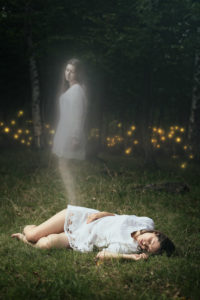Having an out-of-the-body experience (an OBE) doesn’t make you special.
An OBE can make you feel unmoored.
An OBE can change your perspective on how you once thought the world worked.
An OBE can make you realign your priorities.
Once you accept these changes, you’ll feel less anxious.
They might feel weird, but they’re so common that they’ve not rare.
Are OBEs rare?
According to confidential surveys, around 10 percent of the population has had one.
That means there are more people walking around who’ve had out-of-the-body experiences than who are gay, and about half as many people as who are left-handed.
They simply choose not to talk about it.
That makes it a pretty common experience. That’s something that needs to be said and understood. No need to feel weird about it.
Maybe you were dehydrated when you felt like you were going out of your body.
No?
Well, maybe not.
Nevertheless, that’s a large number of people who’ve felt that way.
It’s more common, too, in some families than it is in others.
Why do so many people have these types of experiences?
One reason for the high number of people who have had out-of-the-body experiences is that there are many different types of out-of-the-body experiences.
People who have died and come back through cardiopulmonary resuscitation (CPR) tend to have them. When they’re able to be physically verified they’re called a NDE (near-death experience).
People who have had certain types of dreams have had them.

So have some people who have done hallucinogenic drugs.
When they’ve had that kind of experience, do they go outside of their body?
How can you tell for sure? The soul or human consciousness has no weight, no mass. You can’t measure it.
The senses can indeed be fooled, but are they always inaccurate?
Of course not.
If they are, then nobody needs to be driving around. It’s too dangerous.
It’s not what you know, it’s what you do with that knowledge
As with any experience, knowledge, or anything else you might have, what matters is what you do with it.
An out-of-the-body experience is a sensation where the mind seems to be apart from the body. People report floating above their room and looking down at their body, sometimes connected by a silver cord.
Sometimes they’re not in the room where their body is. Sometimes they’re in an entirely different place.
Sometimes they’ve been declared clinically dead.
Sometimes they haven’t.
No matter the details of the individual experience, out-of-the-body experiences are fairly common and transcend cultures.
When this happens with a phenomenon, there are going to be many different names for it. Out-0f-the-body experiences are no exception.
It has been called a near-death experience, autoscopy, astral projection, and spirit walking. The terms have different connotations, but they all mean roughly the same thing. Near-death experience refers to an experience one has had when they’ve been clinically dead. Astral projection is when one is asleep. Spirit walking is a term used in Native American culture. Autoscopy is the term for a group of similar phenomena.
Out-of-body experience dream
One who has had a dream where they’ve gone out of their body can question whether they’ve actually done that. Such dreams can feel real.
If dream logic seemed to apply during the OBE, then it probably was a dream.
If not, then maybe, especially if you don’t have any report where people tell you how you died.
According to a study of 1,300 near-death experiences (NDEs), while no near-death experience is exactly alike, some commonalities occur even across cultures. Out-of-body experience dreams have not been similarly studied.
Experiences In The Core Near-Death Experience (NDE)
- Separation of the consciousness from the physical body (75.4 percent)
- Heightened senses (74.4 percent)
- Intense emotions (76.2 percent)
- Passing into or through a tunnel (33.8 percent)
- Encountering a mystical or brilliant light (64.6 percent)
- Encountering mystical beings (eg. angels), deceased relatives or friends (57.3 percent)
- A sense of alteration of time and space (60.5 percent)
- A life review (22.2 percent)
- Encountering unworldly realms (52.2 percent)
- A decision to return to the body (58.5 percent)
Skeptic organizations have gone to great lengths to debunk them in presentations, magazines, and the Internet.
Scientists have tried classifying and explaining them, even inducing them in a laboratory. Critics of those tests point out that there aren’t commonalities, and that those experiences are more akin to hallucinations.
While it’s important to make sense of them, that’s more of a process for the person who had the experience to reconcile between the ideas of these groups and his or her own.
There’s no reason there couldn’t be more than one cause, some more common than others.
The individual is the one who has the experience. Even if the skeptic accurately determines the origins of the experience, it doesn’t really matter. The experience affects the individual. That’s where the impact lies, though the impact can extend beyond the individual.
What should you make of an OBE?
Whether or not your soul or your consciousness ascended out of your body shouldn’t matter.
Two main things are more important:
1. What did you get out of it?
2. How did it change you (if it did)?
Like all of these subjective experiences, it’s personal.
Beyond that, if you tell others about your insights and they benefit from it, all the better.
Unfortunately, when you say you’ve had these kinds of experiences, some people will immediately assume you’re on drugs or crazy.
Most people who have had them have no physical proof of their experience. Others assume they’re lying.
You’re probably not going to convince them you’re a liar. They’ve got a lot emotionally invested in their rationalist perspective.
It shouldn’t bother you. It’s the way it is.
They’re looking at it this way because some people who have had out-of-body experiences see it as a way to soothe and buffer their ego. The out-of-the-body experience is a source of pride.
This attitude and way of carrying yourself doesn’t fool anyone except another fool.
There are two broad classes of writing about the phenomena. On one side is the writing of skeptics who try to discredit people who have had them. They suggest many people who have had them are simply lying, under the influence of drugs, or have something wrong with their brain.
The other side a those who attempt to assign some metaphysical reasoning and importance to the phenomena.
Neither of those groups provides much in the way of utility to the person who has had an out-of-the-body experience and wants to know what they can do with the information.
How to understand the out-of-body experience
If it happened while you were sleeping, analyze it like a dream. Take the components of the dream and, one by one, understand if there was some symbolism behind the components.
The components of a dream are the language with which the subconscious communicates.
If this approach doesn’t seem to be getting you anywhere, try to verify the experience to yourself. For example, were you floating above a room or your bed? Were you able to read anything on a book or newspaper in the scene? Did you travel anywhere? Take careful note of any details you might remember. Could it have been a really weird dream?
Some people have said their out-of-body experience took them to another land. As with a more conventional destination, it’s important to get as many details as you can.
Do you feel strongly about your out-of-the-body experience? Some people who have been clinically dead come back and, after the experience, say they look at the world with new eyes. Often, they report going through a tunnel and meeting loved ones who have departed on the other side. They say they are no longer afraid of dying. That kind of out-of-the-body experience would be profoundly transformative.
Some people desperately want to have something amazing happen to them. They want to be regarded as special by others. Telling others this happened to you is a way of making yourself stand out from others. This is a temptation to be avoided.
Individuals like this present irresistible targets for skeptics to skewer. They serve as strawmen to discredit the whole phenomenon.
It’s illogical to think that even though out-of-body experiences can be induced in a laboratory and that sometimes people lie about having them, that every report of an out-of-body experience is a lie, the result of a damaged mind, or being under the influence of some substance.
It’s a personal experience where actual physical proof is impossible.
The only thing that matters in the great scheme of things, therefore, is the insight gained from experience, even if the insight is, simply, that yes this happens sometimes.
Beyond that, the only other thing that matters is what you’re able to do with that insight. Did it change you? Should the experience have changed you?
People usually don’t feel like they gain insights from drug trips, though anything is possible.
That’s as hardcore scientific as studying these phenomena is ever going to get. The scientific method is focused on the material world. Out-of-the-body experiences occur in another realm. They’re an experience.
Being able to reproduce them doesn’t prove that they don’t occur at least sometimes and that the sensation is valid. All it does is suggest the possibility that this is what might have happened.
For further reading:
Does paying attention to your dreams make you a mystic?
How to use brainwave entrainment to reach your goals
Learn anatomy and physiology before you need it
Tired all the time? How’s your vitamin D?
William Whitty Hall: the man who, for a time, changed how America slept
James Cobb, RN, MSN, is an emergency department nurse and the founder of the Dream Recovery System. His goal is to provide his readers with simple, actionable ways to improve their health and maximize their quality of life.
The DRS includes affiliate links for which we receive a small commission if something is purchased through the link.
Updated Jan. 26, 2023
